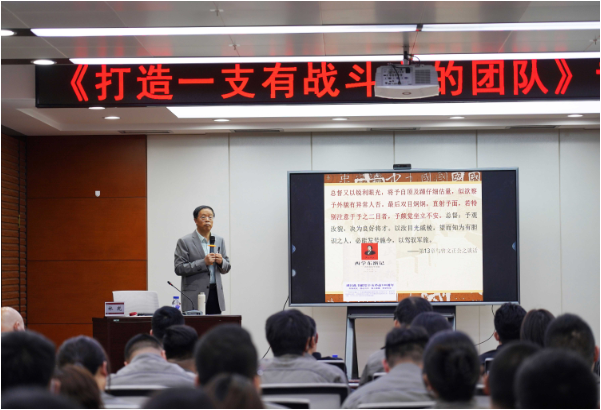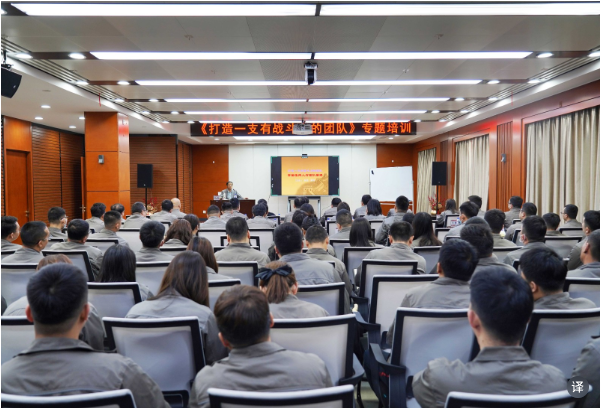Blog
OLED conducts a special training on "Building a Combat-Ready Team"
Release time:
2024-05-14
Focusing on team building and solidifying the foundation for development. From May 11 to May 12, Jilin OLED Material Tech Co., Ltd. (hereinafter referred to as "OLED" or "the company") organized a special training on "Building a Combat-Ready Team" to further strengthen the company's talent cultivation and team building, continuously activating the company's talent "fresh water". This training invited Professor Lin Qian, Vice Dean of the Institute of Legal History at China University of Political Science and Law, doctoral supervisor, to give a lecture, conducted via video conference in Shanghai and Changchun. Personnel above the class leader level from various departments and subsidiaries of the company participated in the training.

Professor Lin Qian visited Aolaide to give a lecture.
During the training session, Professor Lin Qian focused on aspects such as "Identifying and Utilizing People", "Team Building", "The Way of Treating Subordinates", and "Team Construction", combining ancient wisdom with contemporary corporate management, and using practices from companies like Huawei as case studies to vividly explain how an excellent company needs to cultivate cadres and build teams.

Changchun training venue.
Professor Lin Qian pointed out that Zeng Guofan is known as one of the "Four Great Ministers of the Late Qing Dynasty", and Mao Zedong greatly admired him, stating that he "handled the Hong and Yang campaign perfectly". His "Family Letters of Zeng Guofan" have also been highly praised, with Chiang Kai-shek once commenting that he was "a model of the spirit of the Chinese people". Despite high evaluations in later generations, Zeng Guofan initially had no soldiers during the late Qing Dynasty, starting from scratch and only began leading troops at the age of 42, raising funds to establish the Xiang Army, gradually moving to the center stage of the Qing Empire.
Systemic conflicts and personal character conflicts caused Zeng Guofan to suffer greatly, but also led to the eruption of the spiritual strength he accumulated over decades. "The more difficult the military situation, the more opinions are divided, the clearer and more determined one must be, and one must work hard on the word 'patience'", Professor Lin Qian summarized Zeng Guofan's success in nine words: "domineering, enduring hardship, and being patient". In today's context, this spirit is still revered by many excellent companies, especially those like Aolaide that are "specialized, refined, and innovative". The company's chairman, Xuan Jingquan, often speaks of "building strong fortifications and fighting stubborn battles" and "guarding simplicity", which requires employees to patiently do research and development, production, quality inspection, and other work year after year, day after day. Doing these jobs well requires endurance, and this endurance is undoubtedly very important for "hard technology" companies in the current context of vigorously developing new productive forces.

Shanghai training venue.
Professor Lin Qian summarized Zeng Guofan's first principle of identifying people, the "Five Arrivals and Five Diligences" - "Body arrives, heart arrives, eyes arrive, hands arrive, mouth arrives; body diligent, eyes diligent, hands diligent, mouth diligent, heart diligent." In addition, Zeng Guofan had his own set of mnemonic rules for identifying people: "To see the right and wrong, look at the eyes and nose; to see the truth and falsehood, look at the lips. To see achievements and fame, look at the spirit; to see wealth and nobility, look at the spirit. To see intentions, look at the fingers; to see storms, look at the tendons of the feet. If you want to see order, it all lies in language." Zeng Guofan's second principle of identifying people is to practice concepts and value the three connections. He particularly emphasized team building and valued the three connections: blood ties, geographical ties, and occupational ties, with most of his generals being from Hunan and Xiangxiang.
In terms of selecting officials, Zeng Guofan also summarized two sets of standards suitable for civil and military officials. The four major standards for military officials are: "First, they must have the talent to govern the people; second, they must not be afraid of death; third, they must not be overly eager for fame and fortune; fourth, they must be able to endure hardship." The four major standards for civil officials are: having integrity, being free of official airs, being orderly, and speaking less grandly. The so-called "official airs" refers to being slick and opportunistic, having too many tricks, being perfunctory, and unable to bear great difficulties and responsibilities. Zeng Guofan advocated for local ties and grassroots connections, believing that those with local ties should adhere to a "simple" principle, being able to be present, attentive, vocal, and observant in difficult situations, and able to endure humiliation and bear burdens.
In addition, Zeng Guofan placed great importance on the quality of loyalty. He advocated for loyalty and righteousness, believing that "using people should prioritize simplicity, not just talent; only simplicity can last long." Taking Zeng Guofan's heavy reliance on Li Hanzhang as an example, he repeatedly recommended and praised Li Hanzhang due to his loyalty and righteousness. From the establishment to the dissolution of the Xiang Army, Li Hanzhang was the only person who stayed by Zeng Guofan's side throughout. Conversely, he criticized behaviors like "tearing down dilapidated houses".
Zeng Guofan particularly emphasized team building, believing that since ancient times, relationships among colleagues have been the most difficult. The success or failure of colleague relationships and mutual support among colleagues can lead to great achievements. Professor Lin Qian pointed out that the core essence of team building is the formation of a leadership core, where the leader must understand how to humble themselves and resolve differences, and that if the atmosphere is isolated, great things cannot be accomplished. It is essential to promote capable leaders and select good successors during prosperous times.
Professor Lin Qian summarized Zeng Guofan's team management strategy as the "Eight Methods of the Xiang Army": team goals, never abandoning each other in life and death; firmly grasping control; decentralizing power, maintaining mutual support; governance structure, literati leading farmers; selecting generals and branching out, not allowing talented individuals to remain in low positions for long; ensuring harmony among teachers, prohibiting internal strife; generous treatment, high salaries to nurture generals; requiring both strong abilities and loyalty.
Such strategies attracted a large number of talents to Zeng Guofan and the Xiang Army, earning the loyalty of the soldiers. Professor Lin Qian believes that it is essential to cultivate followers from the perspective of human needs. Only by meeting the different needs of survival, development, and value at various stages of life will people be willing to follow, thus achieving great undertakings. Throughout history, the reasons for losing talented individuals have generally boiled down to three: insufficient sincerity, poor treatment, and failure to fully utilize their talents. Avoiding these three points can cultivate subordinates and followers.
This training provided scientific methodological guidance for the talent growth and team building of Aolaide.
recommend News











